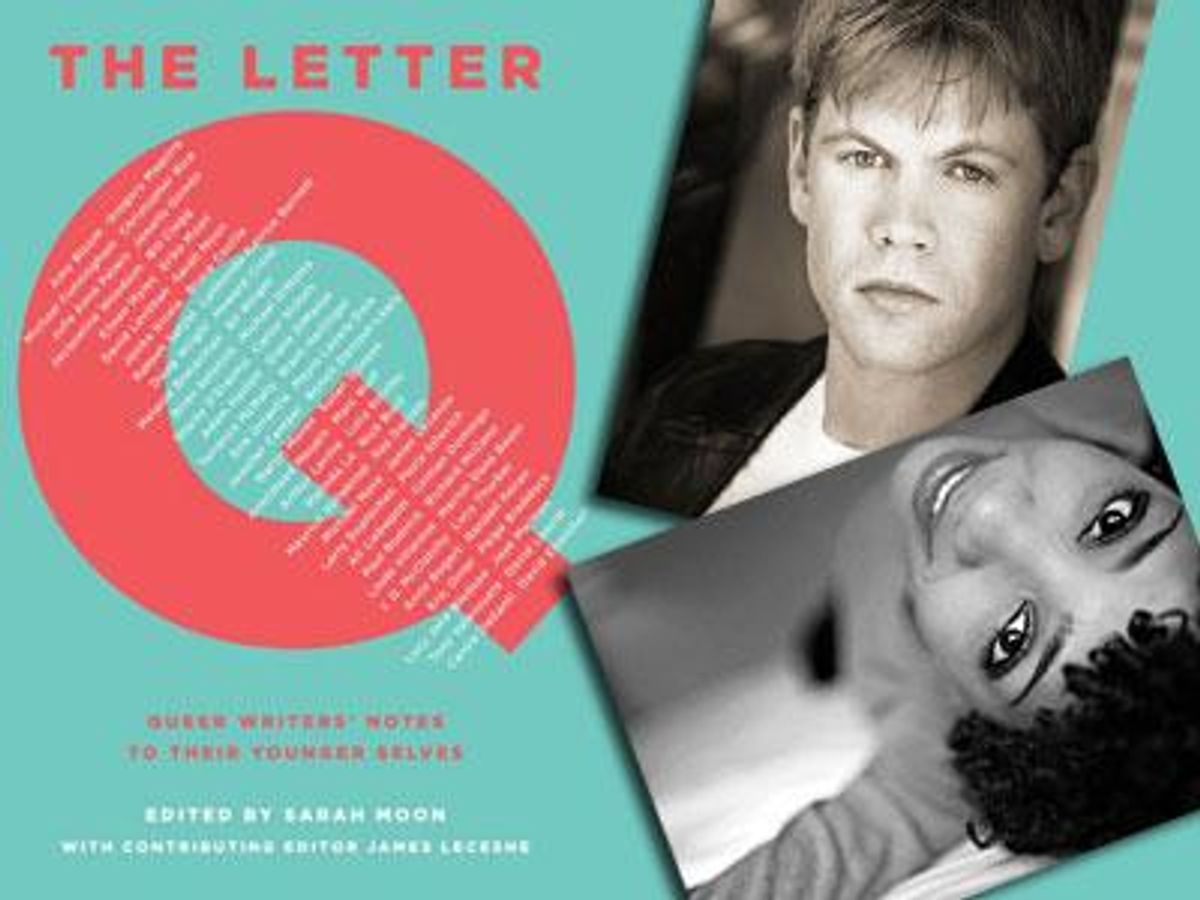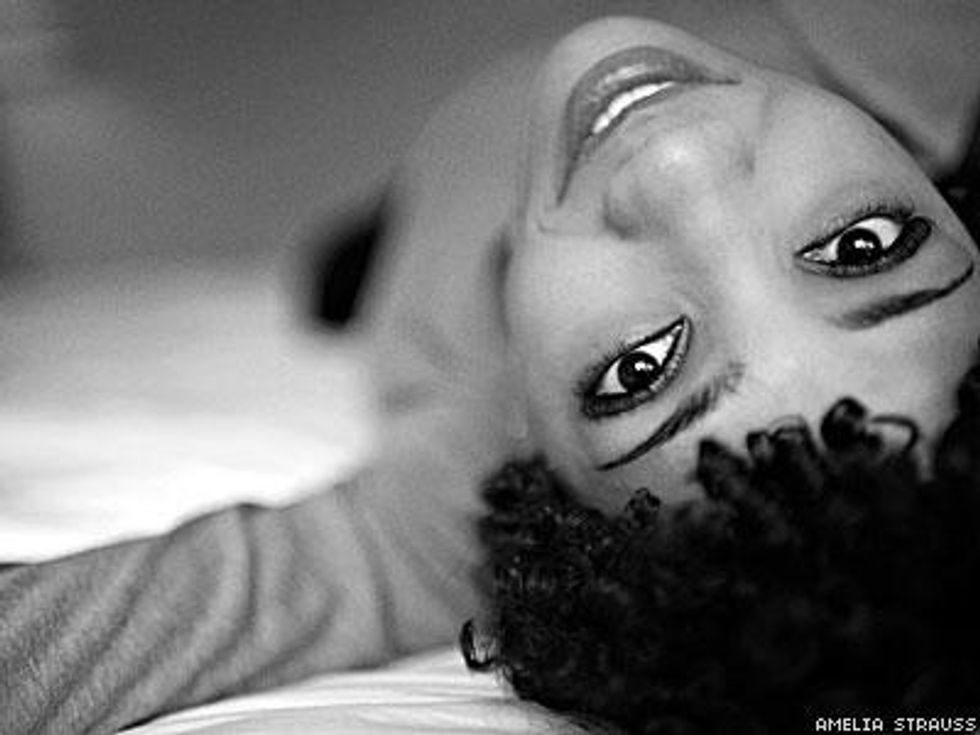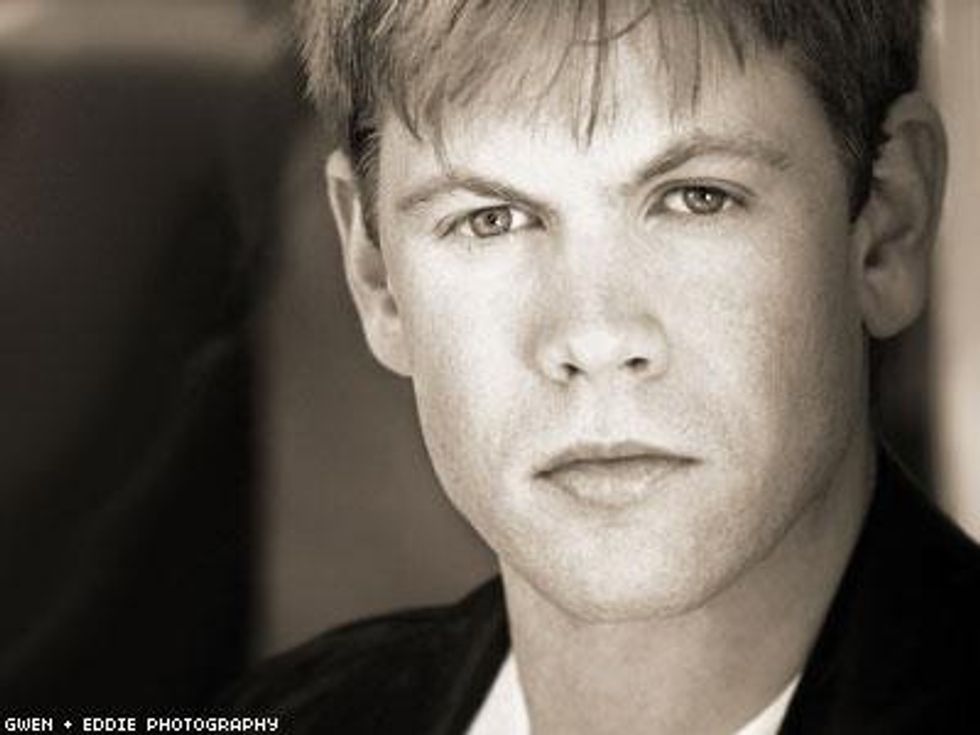Thanks to successes like The Trevor Project and Dan Savage's idea to make "It Gets Better" videos, more people now than maybe ever before are aware of teen suicide. The Letter Q is the most recent book addressing the issue and sheds the formalities of speaking to a broad audience you've never met. It is instead an anthology of letters from LGBT writers to their younger selves.
The result is an intimate experience where the authors address specifics and call themselves out on their own faults. The Advocate caught up with three of the book's contributing writers. Sarah Moon is the high school Spanish teacher and writer who came up with the concept for The Letter Q. Jasika Nicole is known to most as Astrid on the Fox Television series Fringe. Nicole is also the illustrator and writer of the online web comic High Yella Magic. Christopher Rice is author of A Destiny of Souls, The Moonlit Earth, and others. He is also the co-host of the The Dinner Party Show.
The Advocate:Why did you set out to make this book?
Sarah Moon: I'm a teacher, and I have had certain students who've been going through things. And, there are things I've wanted to say to them in a way I never would inside or even outside of the classroom. I was talking to my girlfriend and I said, "I wish I could just write a letter and have that be a book." And she said, "You can't do that, but you could write a book of letters."
What makes this book different than the last "It Gets Better" book?
I spend a lot of time with teenagers. The thing I notice is that they listen when I tell them, "This is how I learned to do that." Then they'll start doing it that way. If I say, "Do this," they say, "Whatever." When I explain that I had trouble with this too, this is why I do this, then they go home and practice because they believe that what you are telling them is true.
Do you think the child version of yourself would take the advice in your letter?
Yeah. I mean, I think it would take her a while to put out the cigarette, take out the earphones, stop rolling her eyes. And then it would be just this puddle of tears and anger.
What were you like as a kid?
I was pretty angry, very scared, and it was covered up with a lot of bravado with a shaved head, bangs, big ol' boots, lots of bumper stickers, and pride rings so enormous they'd knock you unconscious. I was also very sensitive, I mean, more sensitive than is useful to anybody.
As a teacher, would you defy a "Don't Say Gay" bill if it were passed where you live?
Yeah. It's my nature. I can't ask my students to be braver than I am. I'm sure that I would.
Is there anything else you wish you'd written in your letter?
No. I think that letter went through a lot of my trying to leave things out. You go and you say, "You're not saying something." And then you have to say it. There was a lot of wrenching, "I don't want to say this piece." But it's the piece that makes it all true. Saying what you don't want to admit is the thing that brings it all together.
(RELATED: Watch an exclusive, and touching, video about the book on the last page.)
 The Advocate: How did you get involved in the book?
The Advocate: How did you get involved in the book?
Jasika Nicole: We shot the first season of Fringein New York and, in our studio lot, Ugly Bettywas shooting. There was this girl on that crew and we became Facebook friends. After a few years that I'd been living in Vancouver, she messaged me and said, this girl named Sarah Moon is working on this book, I know you do some illustration, would you be interested in me passing along your contact information? So, it was this happy accident all thanks to Ugly Betty.
In the piece you illustrated, we see an image of you as a kid. How would you describe yourself as a kid?
I was shy. I was solitary. I wrote and I drew and I sang in my room by myself. I spent so much time by myself that my mom had to make me go outside and play with other children. Then when I got into middle and high school I threw myself into extra curricular activities; I was in show choir, I was a cheerleader, I was on the dance team, I was in theater. I did everything I could possibly do because I wasn't in a place where I could comfortably deal with all these ideas about who I was in the world and what I wanted to be.
Is there anything you felt you left out of your letter?
If I ever wrote that piece again and it was longer, I'd probably incorporate some stuff about my family. My parents were always extremely supportive of me. It's only now that I'm in a place where I can look back on my experience with my parents and recognize that they did the best they could but maybe they didn't always make the best decisions. My parents were really young when they had me. I would love to do a comic where I talk myself through what I'm dealing with where my parents are concerned.
Do you think the child version of you would take the advice from your letter?
I have no idea. When I think back on my comic and showing my curly hair vs. my straight hair I can't imagine that my straight-haired high school self could see that curly hair and think that it was beautiful. I think to even get past the hair would be really, really difficult for my high school self. Maybe if she read it in some way where the language was something she was more comfortable with but visually I don't think she could handle seeing who I am. I think it would all be too overwhelming.
 The Advocate: Why did you decide to get involved in The Letter Q?
The Advocate: Why did you decide to get involved in The Letter Q?
Christopher Rice: I wanted to speak to the dead ends I felt I took socially immediately after high school in response to the pain and sense of rejection I felt in high school. I wanted to address the false idols that I ended up worshiping.
You're referring to substance abuse and the party scene?
Yeah. I think it was an awakening process, and I think a lot of gay people go through it. To be more specific, the gay people who run right out into the bars the minute they come out and plant themselves on a barstool like I did. For those of us like that, it might take a while to realize that the bars don't deliver on everything they appear to promise.
What was your first thought when you were asked to do the project?
My first thought was that people would think I was too hard on myself. When they didn't send me a letter saying, "Can you lighten up on yourself?" I was kind of relieved. I personally would like to see in the book how the stories vary according to the age of the author. Because, speaking back to yourself in 1996 is different than speaking to yourself in 1954.
Were you bullied in school?
I didn't have that experience. I think a lot of people thought I did because my first book was about a kid who was pretty ruthlessly bullied. What I had to learn as I got older is what realbullying is. Guys making fun of you in the hallway is unpleasant, but as I came out I met people who had actuallybeen bullied. I met people who had been subjected to consistent physical violence throughout their elementary and high school years because they were gay.
Did you have a support structure outside of your parents?
I had really great teachers.
Having relied on teachers in that way, do the "Don't Say Gay" bills terrify you?
You know, I hear about those bills and I think they are utterly preposterous. They're not going to survive the marketplace of ideas. Maybe I'm just whistling in a graveyard, but yes, they absolutely terrify me.
In the book, you send a letter to yourself. Is there a letter you would send to your mother (Anne Rice) about your younger self?
I think on balance my mother did a really great job. You know, I think I'd give her a list of warnings. As a child I had terrible neurotic fears. Mom was afraid they were never going to go away. I would encourage her that eventually her son would be able to tell the difference between real life and her son's thoughts. I think it frightened her to see she has such an emotionally sensitive child. It is odd, I mean, she had a child who died of a very real illness (leukemia) and then their next child was afraid of things that weren't even real. My mother always said, "The ones that had forgiven their parents for all the 'terrible things' they'd done, were the ones that had had children and realized how difficult it is to raise children." When I finally had to deal with myself one on one as an adult, I'm not sure I would have wanted to raise me. I don't know if I would have done such a perfect job.
Learn more about book readings at:
New York
June 28
Word Bookstore, 126 Franklin Street, Brooklyn, NY 11222
Authors are still being confirmed but they include:
Sarah Moon, David Levithan, David Ebershoff, Eric Orner, Diane DiMassa,
and more to come!
San Francisco
June 29
Books Inc, 2275 Market Street, San Francisco, CA 94114
Confirmed authors include: Malinda Lo, Lucy Bledsoe, and Michael Nava


 The Advocate: How did you get involved in the book?
The Advocate: How did you get involved in the book? The Advocate: Why did you decide to get involved in The Letter Q?
The Advocate: Why did you decide to get involved in The Letter Q?















































































Viral post saying Republicans 'have two daddies now' has MAGA hot and bothered